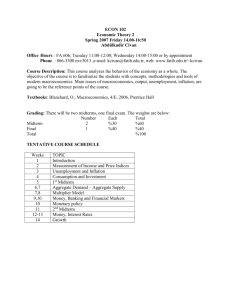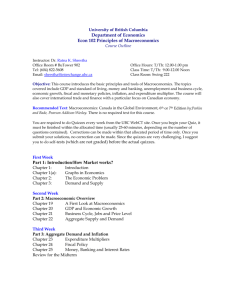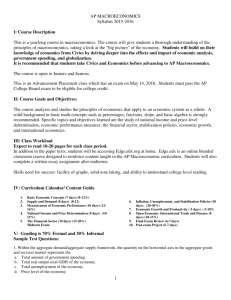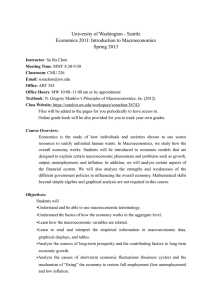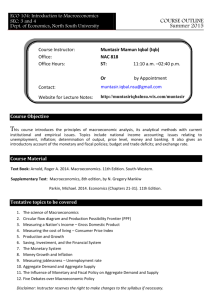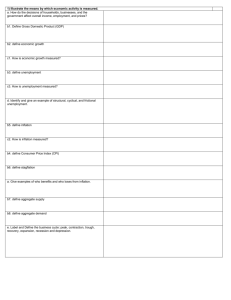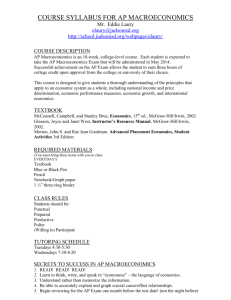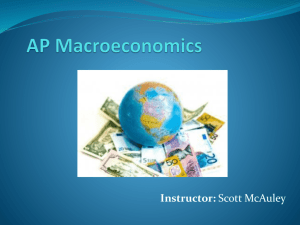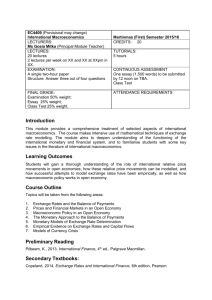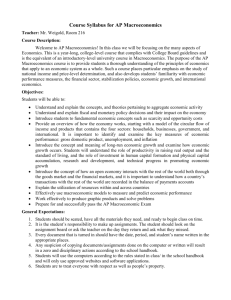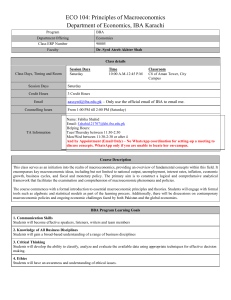Identification Subject (code, title, credits) ECON 202 Principles of
advertisement
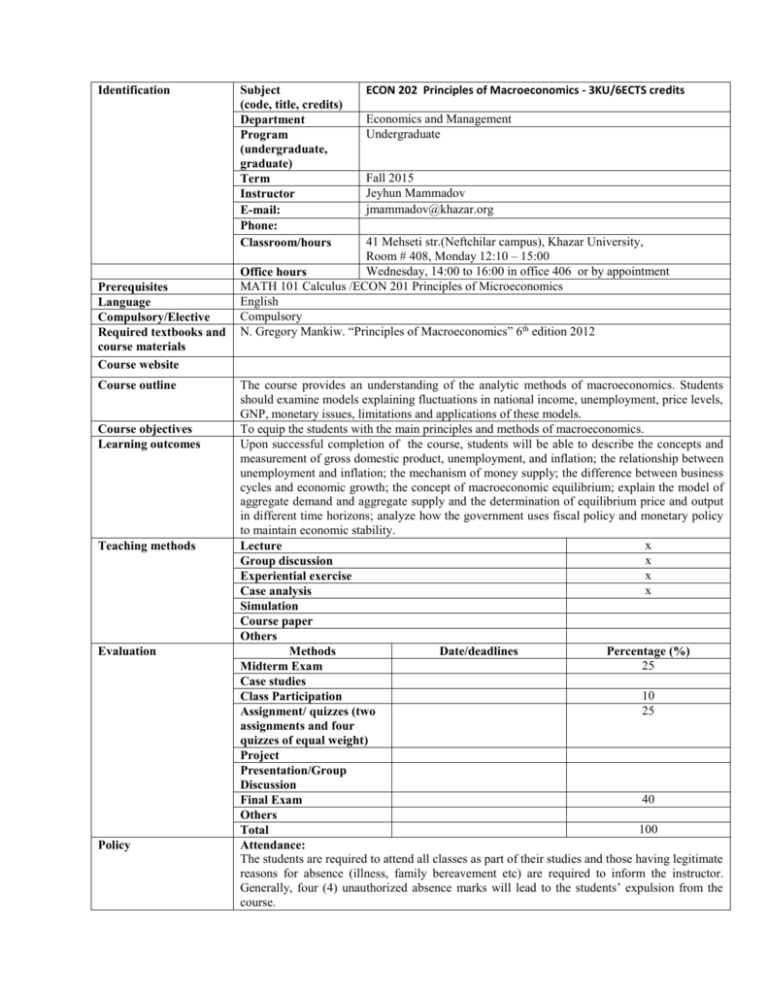
Identification Prerequisites Language Compulsory/Elective Required textbooks and course materials Course website Course outline Course objectives Learning outcomes Teaching methods Evaluation Policy Subject (code, title, credits) Department Program (undergraduate, graduate) Term Instructor E-mail: Phone: Classroom/hours ECON 202 Principles of Macroeconomics - 3KU/6ECTS credits Economics and Management Undergraduate Fall 2015 Jeyhun Mammadov jmammadov@khazar.org 41 Mehseti str.(Neftchilar campus), Khazar University, Room # 408, Monday 12:10 – 15:00 Wednesday, 14:00 to 16:00 in office 406 or by appointment Office hours MATH 101 Calculus /ECON 201 Principles of Microeconomics English Compulsory N. Gregory Mankiw. “Principles of Macroeconomics” 6th edition 2012 The course provides an understanding of the analytic methods of macroeconomics. Students should examine models explaining fluctuations in national income, unemployment, price levels, GNP, monetary issues, limitations and applications of these models. To equip the students with the main principles and methods of macroeconomics. Upon successful completion of the course, students will be able to describe the concepts and measurement of gross domestic product, unemployment, and inflation; the relationship between unemployment and inflation; the mechanism of money supply; the difference between business cycles and economic growth; the concept of macroeconomic equilibrium; explain the model of aggregate demand and aggregate supply and the determination of equilibrium price and output in different time horizons; analyze how the government uses fiscal policy and monetary policy to maintain economic stability. x Lecture x Group discussion x Experiential exercise x Case analysis Simulation Course paper Others Methods Date/deadlines Percentage (%) 25 Midterm Exam Case studies 10 Class Participation 25 Assignment/ quizzes (two assignments and four quizzes of equal weight) Project Presentation/Group Discussion 40 Final Exam Others 100 Total Attendance: The students are required to attend all classes as part of their studies and those having legitimate reasons for absence (illness, family bereavement etc) are required to inform the instructor. Generally, four (4) unauthorized absence marks will lead to the students’ expulsion from the course. Week Tardiness/ other disruptions Date/Day (tentative) 1 2 14.09.15 21.09.15 3 4 5 6 28.09.15 05.10.15 12.10.15 19.10.15 7 8 9 10 26.10.15 02.11.15 09.11.15 16.11.15 11 12 23.11.15 30.11.15 13 14 15 07.12.15 14.12.15 21.12.15 If a student is late to the class for more than ten (10) minutes, s/he is NOT allowed to enter and disturb the class. However, this student is able to enter the second double hours without delaying. Preparation for class The structure of this course makes your individual study and preparation outside the class extremely important. The lecture material will focus on the major points introduced in the text. Reading the assigned chapters and having some familiarity with them before class will greatly assist your understanding of the lecture. After the lecture, you should study your notes and work relevant problems from the end of the chapter and sample exam questions. Throughout the semester we will also have a large number of review sessions. These review sessions will take place during the regularly scheduled class periods. Withdrawal (pass/fail) This course strictly follows grading policy of the School of Economics and Management. Thus, a student is normally expected to achieve a mark of at least 60% to pass. In case of failure, he/she will be referred or required to repeat the course the following term or year. For referral, the student will be required to take examination scheduled by instructor. Assignments/quizzes There will be minimum three quizzes and two assignments. Quizzes and home assignments will constitute 25 percent of the final grade. Makeup quizzes will not be given except in the case of dire emergency. Cheating/plagiarism Cheating or other plagiarism during the Quizzes, Mid-term and Final Examination will lead to paper cancellation. In this case, the student will automatically get zero (0), without any considerations Professional behavior guidelines The students shall behave in the way to create favorable academic and professional environment during the class hours. Unauthorized discussions and unethical behavior are strictly prohibited. Tentative Schedule Topics Textbook/Assignments The data of Macroeconomics Measuring a nation’s income Measuring the cost of living The real economy in the long run Production and growth Saving, investment and the financial system. Quiz 1 The basic tools of finance. Unemployment Money and prices in the long run The monetary system. Quiz 2 Ch. 10 Ch. 11 Ch. 12 Ch. 13 Ch. 14 Ch. 15 Ch. 16 Midterm Exam Holiday Money growth and inflation The macroeconomics of open economies Open-economy macroeconomics: basic concepts A macroeconomic theory of the open economy Short-run economic fluctuations Aggregate demand and aggregate supply. Quiz 3 The influence of monetary and fiscal policy on aggregate demand Short-run trade-off between inflation and unemployment. Debates over macroeconomic policy. Quiz 4 Final Exam This syllabus is a guide for the course and any modifications to it will be announced in advance. Ch. 17 Ch. 18 Ch. 19 Ch. 20 Ch. 21 Ch. 22, 23
